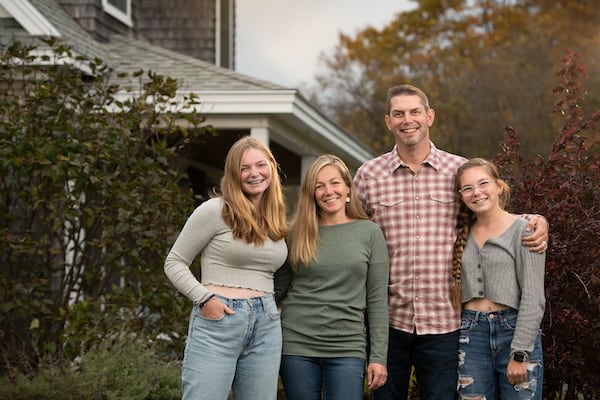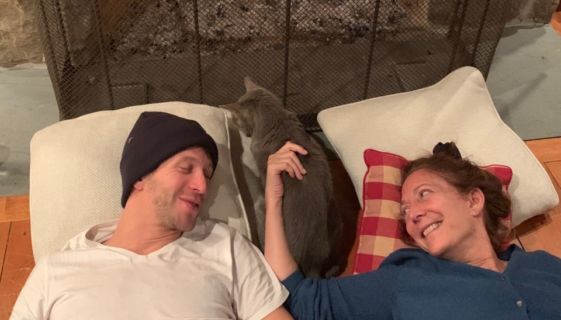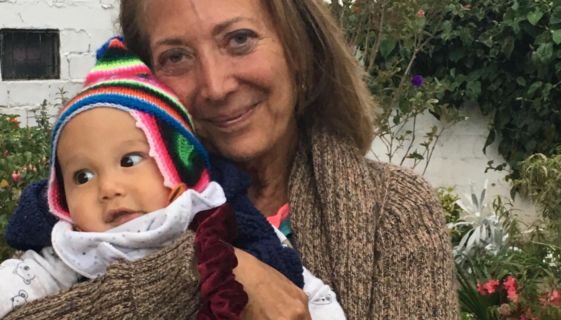“We are changing what it means to “Man Up” in the face of cancer. It’s not just about being tough. It means having the courage to accept help, and knowing we are smarter and stronger as a pack than we are as lone wolves.” – Trevor Maxwell, Founder, Man Up to Cancer
What is Man Up to Cancer?
Man Up to Cancer is an online community that inspires men to connect and avoid isolation during our cancer journeys. We offer a podcast, website, social media channels, and a Facebook group with more than 1,500 men impacted by cancer. Man Up to Cancer also operates a Chemo Backpack program, sending backpacks filled with practical items to men going through chemotherapy.
We are changing what it means to “Man Up” in the face of cancer. It’s not just about being
tough. It means having the courage to accept help, and knowing we are smarter and stronger as a pack than we are as lone wolves.
Men often don’t feel comfortable sharing about the physical and emotional impacts of cancer in a co-ed environment. When men lack communication skills, or when they are dealing with a sensitive hardship such as loss of sexual function, they are even less likely to join groups. This robs them of the proven health benefits of peer-to-peer support.
We provide a judgment-free zone where men can provide support to others, receive support, or both, on their own terms and with no expectations. Our podcast and other digital content addresses common problems faced by our community members.
What inspired you to become a passionate advocate for creating a community for men through Man Up to Cancer?
I was 41 years old when I was diagnosed with stage IV colon cancer, and it was a complete shock. I was living a fulfilling life with my wife, Sarah, and our two teenage daughters, Sage and Elsie, who are the lights of my life, and working as a self-employed writer, editor, and public relations consultant.
After my diagnosis, I struggled mightily with anxiety and depression. I started to seek help in support communities, both online and in person here in Maine. I quickly realized that in those support spaces, women generally outnumbered men by at least a 3 to 1 ratio.
In my heart I knew that other men were struggling with the emotional impacts of cancer, and it troubled me that they simply weren’t seeking help. So I dove into research and learned that men are much more likely to isolate after a cancer diagnosis, and that is often related to our cultural conditioning. Many men are taught that seeking help is a weakness, and that we should be able to handle all our challenges on our own. People who isolate during the cancer journey are more likely to suffer mental health problems; they are more likely to have broken relationships; and their medical outcomes are worse than patients who do not isolate. I decided that I wanted to do something to change this.
“People who isolate during the cancer journey are more likely to suffer mental health problems; they are more likely to have broken relationships; and their medical outcomes are worse than patients who do not isolate.”
What was your initial response to your diagnosis compared to now, and have you made any lifestyle changes as a result?
There is really no way to prepare for such a devastating diagnosis. I went from being a typical husband, father, and worker, to being a cancer patient with a life-threatening illness, going through surgeries and chemotherapy, and being inundated with information.
To say that I felt overwhelmed would be an understatement. Today, I still struggle occasionally with the mental health challenges of my diagnosis and treatment, but I think I’ve simply adjusted over time.
“Men are taught that seeking help is a weakness, and that we should be able to handle all our challenges on our own. They are much more likely to isolate after a cancer diagnosis.”
The biggest change I have made is related to food. Prior to my diagnosis, I was definitely a red meat consumer. I grew up eating a ton of processed meats – hot dogs, hamburgers, ham sandwiches, and so on. After my diagnosis, I started to learn about the connection between processed meats and cancer. Nowadays, I occasionally still have a burger, maybe once every couple of months.
I also make sure that I get more exercise than I did prior to diagnosis. We know that exercise is one of the most important factors in preventing recurrence, and that it promotes long-term survival after a cancer diagnosis. I enjoy rocking out to music while I ride my stationary bike in the colder months, and then hitting the trails on my mountain bike when it gets warm.
“The biggest change I have made is related to food.”
What is general advice that you give to people newly diagnosed with cancer?
Three things are at the top of my list: Avoid isolation; Get second opinions; Know your biomarkers. Also, I always remind people who are newly diagnosed that cancer is usually a marathon, not a sprint. Enjoy your friends, don’t isolate. You have to keep living, keep doing things that bring you joy, keep eating and sleeping, and always remember to breathe!
Any quotes, songs, or books that get you through tough days?
In our Man Up to Cancer group, we have a beloved hashtag, #KFG. It means “Keep Effing Going.” Some people might think of this as crude, but sometimes there is nothing like a good swear word to motivate you for the day. The message is simple and powerful: No matter what awful things you are going through, no matter how difficult things are, no matter how much you just want to give up and quit, you have to keep putting one foot in front of the other. You have to KFG – for yourself and the people who love you. Any man with a cancer diagnosis is welcome to join Man Up to Cancer. To learn more, please visit www.manuptocancer.com.





